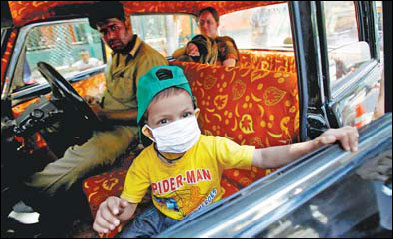Novartis loses landmark patent case
|
Tanmay, 4, who has cancer, leaves after getting treatment at Tata cancer hospital in Mumbai, India, on Monday. India's Supreme Court rejected drug maker Novartis AG's attempt to patent a new version of the cancer drug Glivec. Rafiq Maqbool / Associated Press |
India's Supreme Court rejected a patent bid by Swiss drug giant Novartis on Monday in a landmark ruling activists say will protect access to cheap generic drugs and save lives in developing economies.
In a ruling that went to the heart of patent law in a country known as the "pharmacy to the world", the top court said Glivec - often hailed as a "silver bullet" for its breakthrough in treating a deadly form of leukemia - "did not satisfy the test of novelty or inventiveness" required by Indian legislation.
The court's decision has global significance since India's $26 billion generic drug industry, which supplies much of the cheap medicine used in the developing world, could be stunted if Indian law allowed global drug companies to extend the lifespan of patents by making minor changes to medicines.
Once a drug's patent expires, generic manufacturers can legally produce it. They are able to make drugs at a fraction of the original manufacturer's cost because they don't carry out the expensive research and development.
The case is the highest profile one of several battles being waged in India. It is seen as having far-reaching implications in defining the extent of patent protection for multinational drug firms operating in the lucrative market.
"The ruling has come as a big relief," Leena Menghaney, a lawyer with medical charity Medecins Sans Frontieres, said outside the courtroom. "It will save a lot of lives - not only in India, but across the developing world.
Novartis, which reported net profit of $9.6 billion in 2012 on sales of $56.7 billion, condemned the judgment, saying in a statement it "discourages innovative drug discovery essential to advancing medical science for patients".
Ranjit Shahani, managing director of Novartis India, said, "This ruling is a setback for patients that will hinder medical progress for diseases without effective treatment options."
Pratibha Singh, a lawyer for the Indian generic drug manufacturer Cipla, which makes a version of Glivec for less than a tenth of the original drug's selling price, said the court ruled that a patent could only be given to a new drug, and not to those which are only slightly different from the original.
"Patents will be given only for genuine inventions, and repetitive patents will not be given for minor tweaks to an existing drug," Singh said outside the court.
Novartis has fought a legal battle in India since 2006 to patent a new version of Glivec, known as Gleevec outside India and Europe. Novartis said Glivec is patented in nearly 40 other countries, including China, the United States and Russia.
Anand Grover, a lawyer for the Cancer Patients Aid Association, which led the legal fight against Novartis, said the ruling on Monday prevents the watering down of India's patent laws.
"This is a very good day for cancer patients. It's the news we have been waiting for seven long years," he said.
Medecins Sans Frontieres said Glivec costs $4,000 a month in its branded form, while the generic version is available in India for around $73.
"The difference in price is huge. The generic version makes it affordable to so many more poor people, not just in India, but across the world," said Y. K. Sapru, of the Mumbai-based cancer patients association.
AP-AFP-Reuters
(China Daily 04/02/2013 page12)















